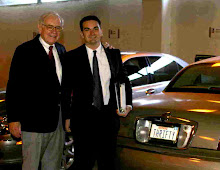Berkshire History in the Making!
I don’t maintain this blog much anymore, but that doesn’t mean I don’t follow Berkshire Hathaway. And I would be remiss not to comment on the news I awoke to this morning.
Today is likely the most historic day in the history of Berkshire. The company is making the largest single acquisition – by a huge margin – that it ever has by acquiring the 75% of Burlington Northern Santa Fe it doesn't already own. Additionally, BRK.B is getting split 50-for-1. No more $3000 shares. Is this the end of the BRK mystique?
Two years ago, while teaching the Warren Buffett class, Burlington Northern CEO Matt Rose visited our MBA program. It proved to be a perfect opportunity for the students to see the tires meeting the track. Berkshire had just made its first major investment in Burlington Northern, and Mr. Rose couldn’t have been happier about it. We were able to quiz him about Buffett’s interest in the company, the company’s growing returns on capital and its position in a changing U.S. economy. We found him to be very personable, optimistic and, at least ostensibly, very honest. I am not surprised whatsoever that Buffett befriended Mr. Rose.
But the most important lesson was a crucial one to the study of Buffett and Berkshire Hathaway. While BNSF was far from a typical Berkshire investment, it had enough of the characteristics Buffett looks for to make it appropriate for Berkshire’s portfolio. Railroads are interesting investments because, on the one hand, they are very capital-intensive and lack what Buffett calls “franchise value.” However, more than compensating for these shortcomings is the economic position of the company.
All railroads – and BNSF in particular given its reach – basically own the transportation rights of anyone wishing to ship goods, much like a toll bridge. Of course, Mr. Buffett famously identified “toll bridge” type businesses as desirable investments early in his career. After his investment in the Buffalo Evening News in 1977, Berkshire was sued by the News’ only competitor. The plaintiff claimed Buffett was trying to drive it out of business to give the News a monopoly in the market. This was probably true. During cross-examination, Buffett explained that newspapers are like “toll bridges” in that they are relatively free to raise advertising rates as much as possible because anyone wishing to advertise in town had nowhere else to turn. I can just imagine his legal counsel cringing as he explained this concept in what was undoubtedly his characteristic simple, matter-of-fact style.
Railroads are very similar. The tracks have been laid, and for the most part will not be expanded. BNSF owns the largest portion of these tracks. With oil and gas prices set to rise (I’m talking long-run here) the greater fuel efficiency of shipping via rail versus truck will become increasingly appealing. And when this shipping occurs via rail, shippers will have little choice over with whom to do business.
Moreover, for a hundred years railroads have been consolidating. Now there are only a few very large railroads left. This seems to have resulted in significant scale economies, because returns on capital are for the first time in many years convincingly and consistently in excess of the cost of capital. These companies are creating value.
A difficulty I have had in teaching the Warren Buffett philosophy over the years is that there are many different attributes that may make for a good stock investment. We can try to construct a checklist of things Mr. Buffett looks for – many people have tried over the years. But the reality is that each potential investment must be evaluated on its own merit, not necessarily its merit relative to some predetermined definition of quality.

